Foundations for the Future: Towards a Permanent EHRI Organisation
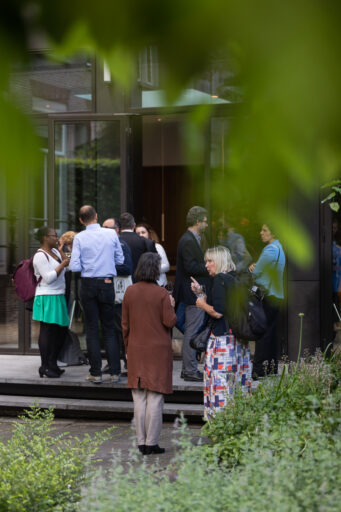
EHRI Conference, 23 May 2023, Amsterdam
“It is time that Europe takes responsibility for the Holocaust”
The EHRI Conference Foundations for the Future, that took place in Amsterdam on 23 May, started with an impressive show of support. Dutch Minister of Education, Culture and Science (OCW) Robbert Dijkgraaf, and Dutch State Secretary for Health, Welfare and Sport (VWS), Maarten van Ooijen, Christian Ehler, Member of the European Parliament and Marileen Dogterom, President of the Royal Netherlands Academy of Arts and Sciences (KNAW) had each recorded short video messages in which they addressed the audience and spoke of the need for a permanent European Holocaust Research Infrastructure (EHRI), while congratulating the project for paving the way towards this goal.
Watch here all 4 Video Messages for EHRI
Hosting country
After three years of hard work, the EHRI consortium announced that it has been very successful in making all the necessary preparations for EHRI to become a permanent organization in January 2025. This permanent organization will be setup as an ERIC, or a European Research Infrastructure consortium, and eleven countries have already committed to be part of the future EHRI-ERIC, and more are in the process of joining. The Netherlands has offered and has been accepted as the hosting country for the Central Office of EHRI-ERIC which will be located at NIOD Institute for War, Holocaust and Genocide Studies. Securing the seat of the ERIC in the Netherlands has been made possible thanks to generous financial support provided by the ministries of OCW and VWS. The KNAW, of which NIOD is a member, has been the coordinator of the EHRI projects from the start.
Jewish neighbourhood
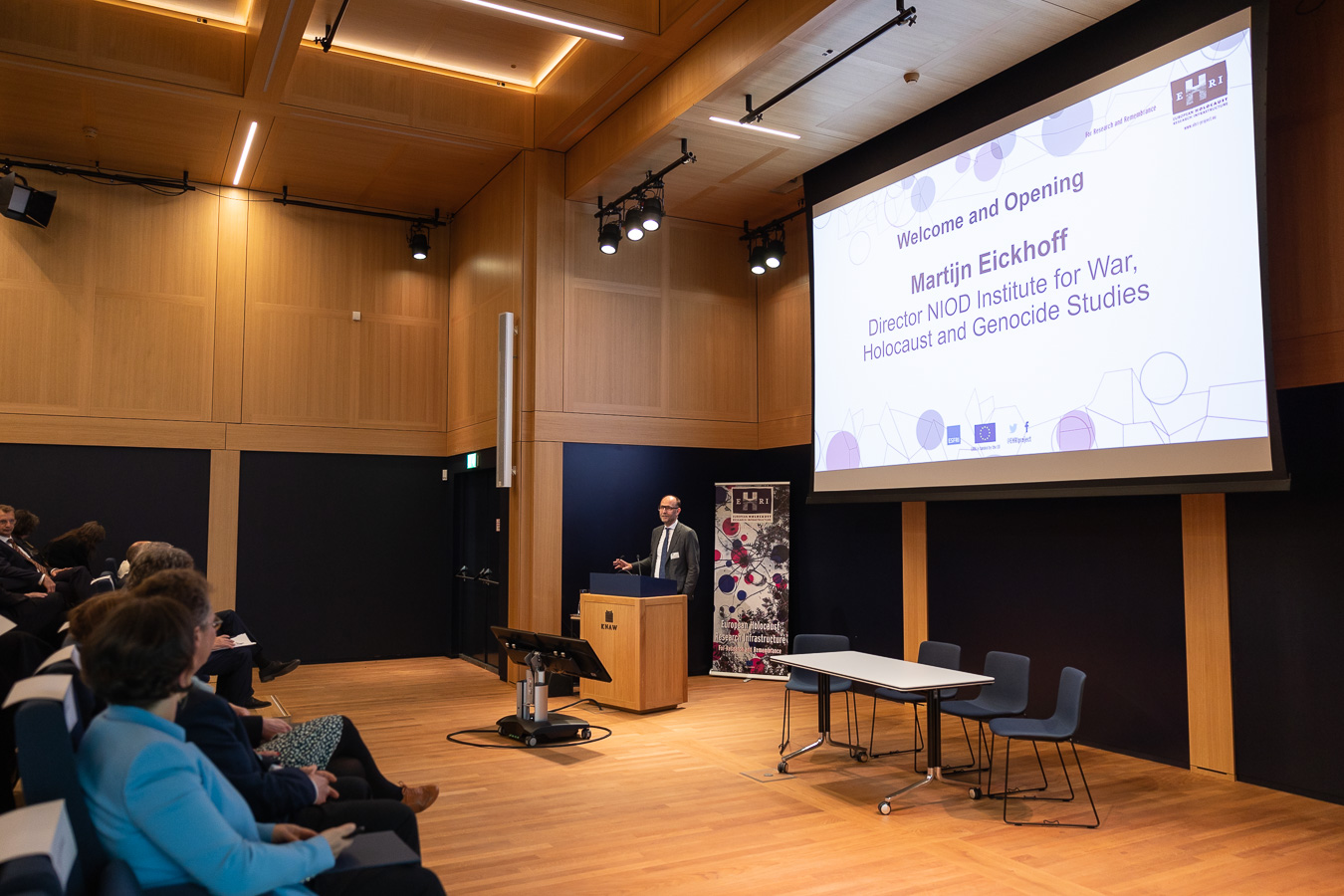
The congratulatory video messages were introduced by the director of the NIOD, Martijn Eickhoff, who welcomed the audience in person and added his own words. Both he and Minister Dijkgraaf mentioned the somewhat uncomfortable appropriateness of the event’s location, the KNAW building the Trippenhuis, which is in the centre of Amsterdam, right where 80 years ago the Jewish neighbourhood was closed off. Martijn Eikchoff also stressed the necessity of safeguarding the Holocaust-related sources and keeping the commemoration alive, especially now, as nationalism, antisemitism and Holocaust distortion are on the rise. All other high-placed officials expressed similar views, be it from a Dutch, European, societal or scientific perspective. “It is time that Europe takes responsibility for the Holocaust”, was a shared opinion, expressed by Martijn Eickhoff. A permanent EHRI that offers support to Holocaust researchers worldwide is an important part of this effort.
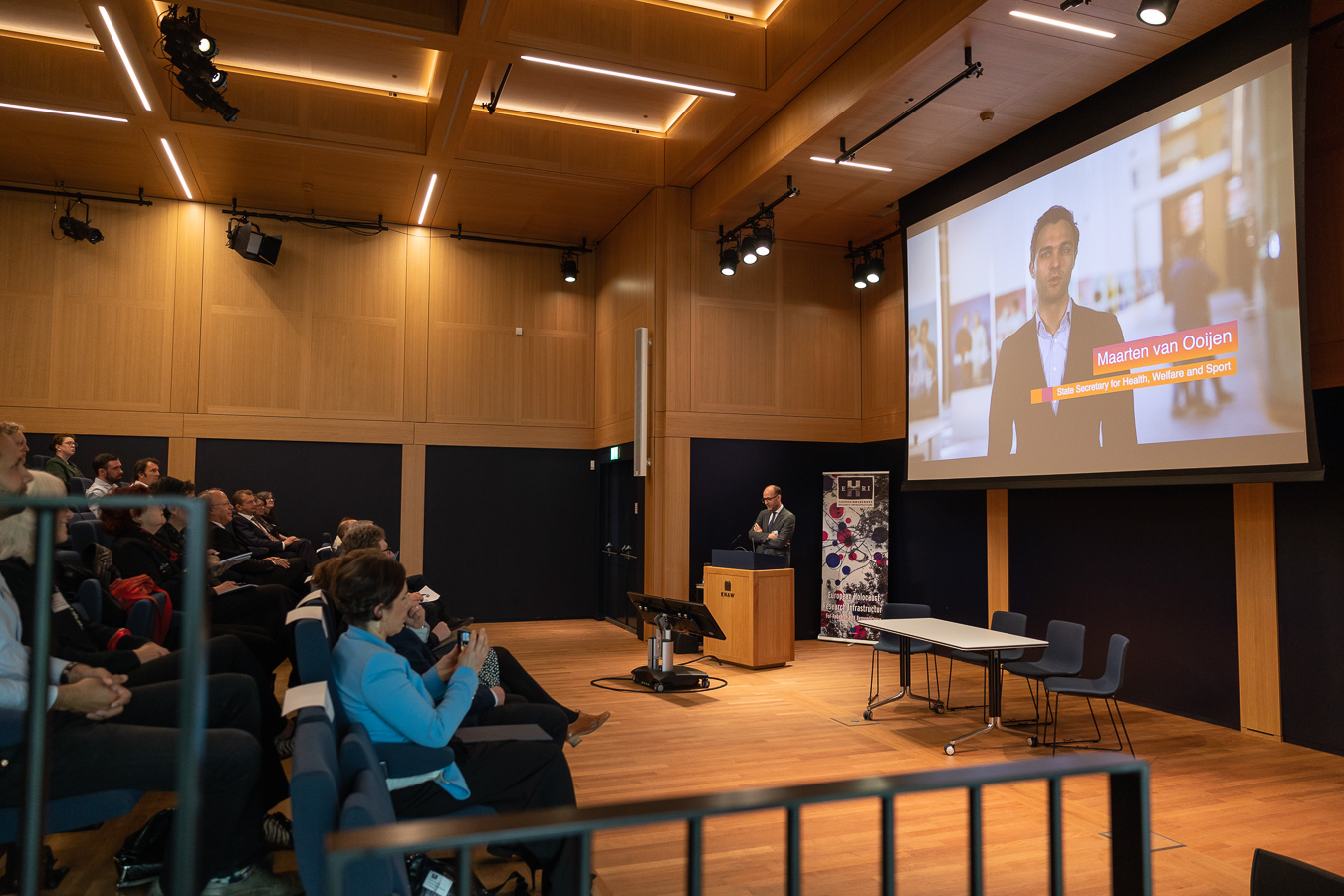
Edyta Gawron
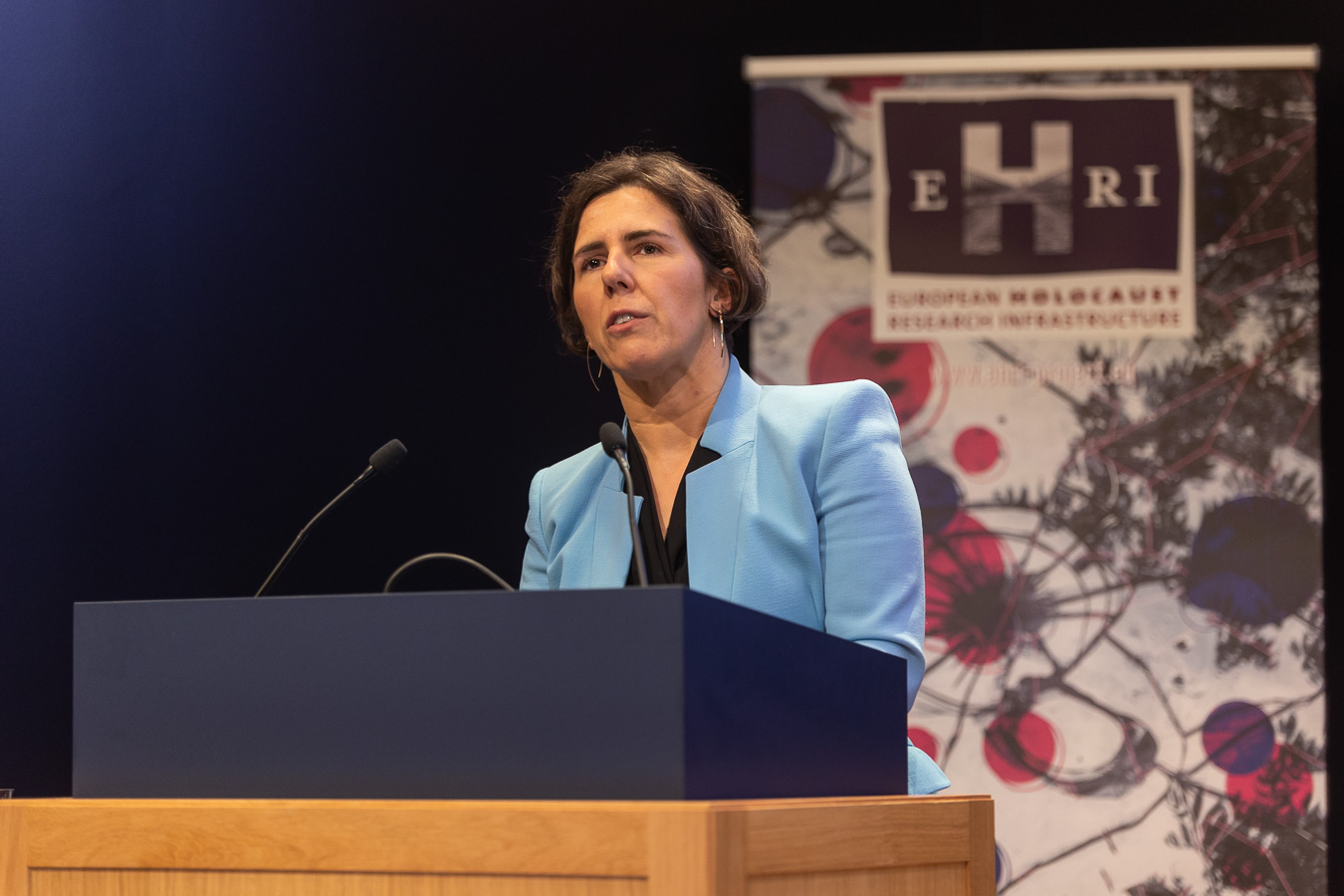
That there is a need to stay alert became also apparent in the keynote speech by Edyta Gawron, titled “Researching Holocaust History and Responding to Current Challenges”. Edyta Gawron, who is Assistant Professor at the Institute of Jewish Studies at the Jagiellonian University of Poland and President of the Management Board of Galicia Jewish Heritage Institute Foundation, as well as Chair of the EHRI Scientific Advisory Board, works in Poland and spoke of the scientific challenges she and Polish colleagues face when researching the Holocaust and writing about it openly. In Poland, new laws have made it difficult to write or speak about research that indicates that Polish people were involved in any form of collaboration with the Nazi occupier. Academics that dare to broach this topic, face laws suits, ostracizing or sometimes even violence.
Excellent progress
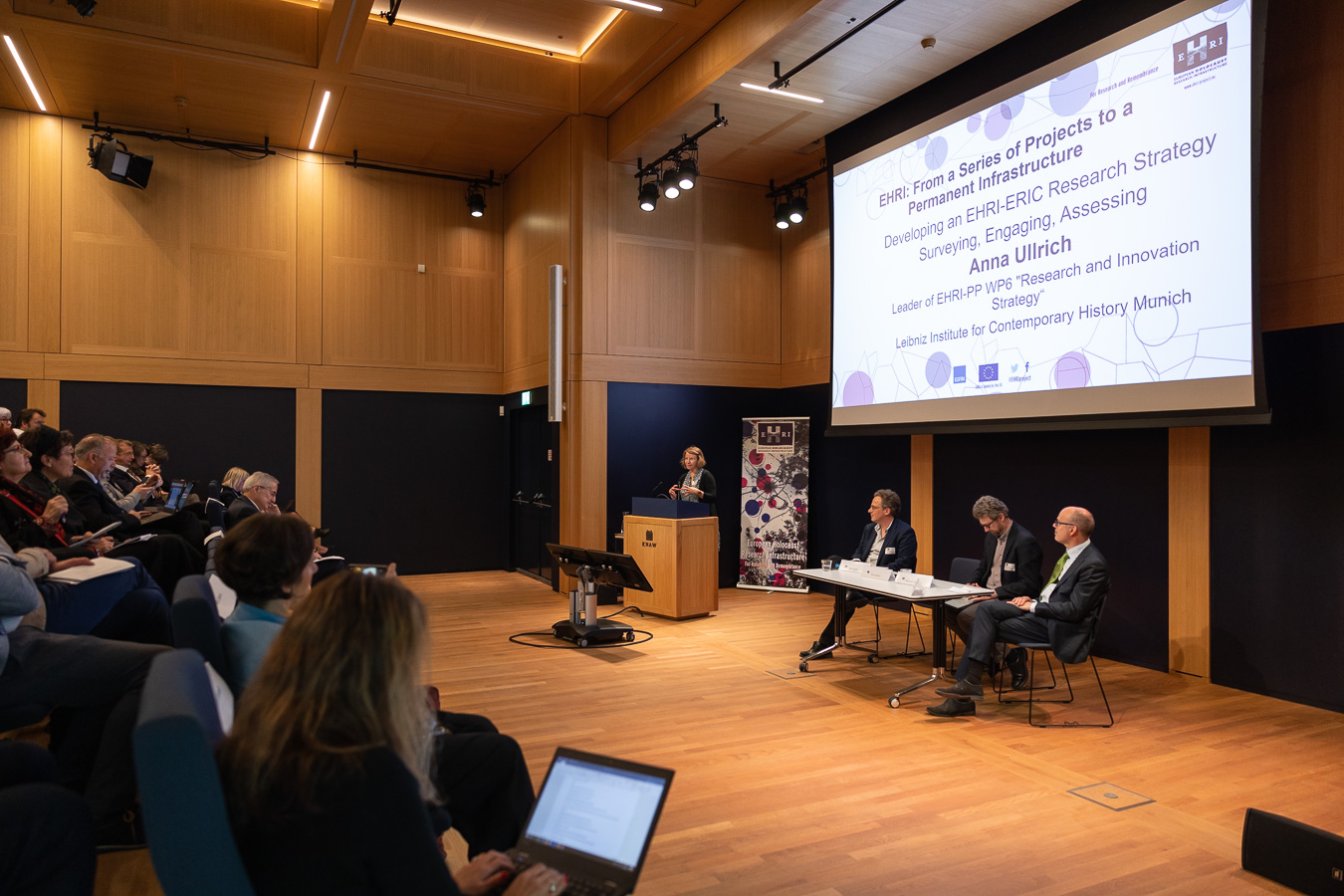
After these strong reminders of the importance of a permanent European Holocaust infrastructure, the conference continued with more practical presentations by co-Director Reto Speck, and Work Package Leaders Anna Ullrich and Michal Frankl, on how EHRI is developing from a series of projects to a permanent, European organisation. Reto explained that while the mission of the permanent EHRI will be the same as the one of the previous projects, the way an ERIC operates in terms of governance, finances and organisation is rather different. A lot of detailed, technical work was required to draft a strong ERIC application which is now ready. Given the excellent progress that has been made, he is confident that EHRI-ERIC will be officially launched in January 2025, on the occasion of the 80th-anniversary of the liberation of Auschwitz.
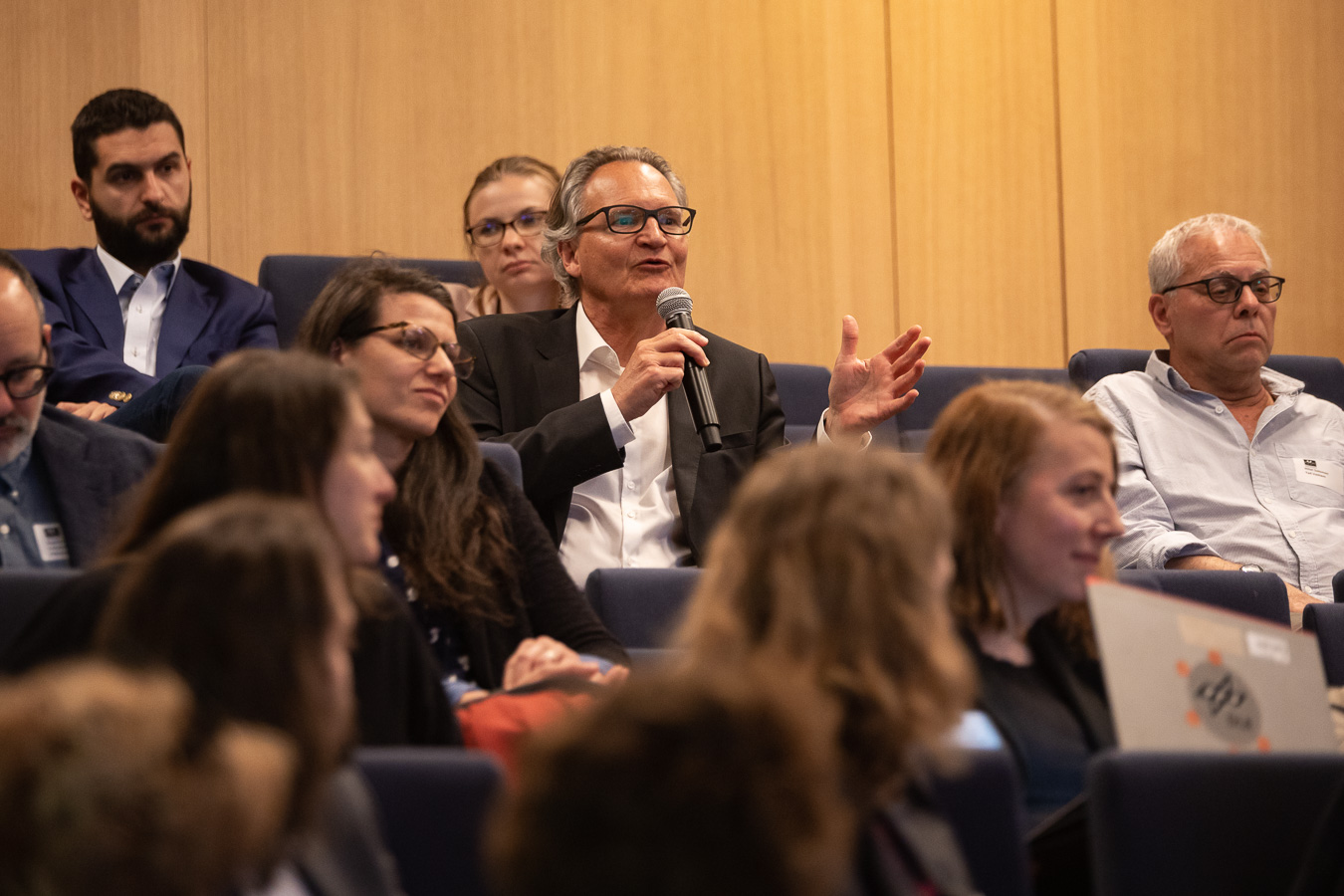
A permanent infrastructure will also need long-term plans and visions. Anna Ullrich talked about how a Research Strategy for EHRI-ERIC is getting shape by surveying and assessing of and engaging with users. Michal Fankl showed an example of an EHRI service, the EHRI Document Blog, which is a laboratory of digital research.
Existing landscape
When becoming an ERIC, EHRI will join the existing landscape of permanent European Humanities Research Infrastructures. The panel that started after lunch, featured Sally Chambers (DARIAH), Franciska de Jong (CLARIN) and Luca Pezzati (E-RIHS). These infrastructures are servicing respectively the Arts and Humanities, the linguistics and cultural heritage communities. EHRI already has good contacts with these infrastructures, and seeks to further increase collaborative activities in the future. In the panel, moderated by Tobias Blanke, the experienced participants shared the challenges they had to overcome and the advantages of having an international infrastructure.
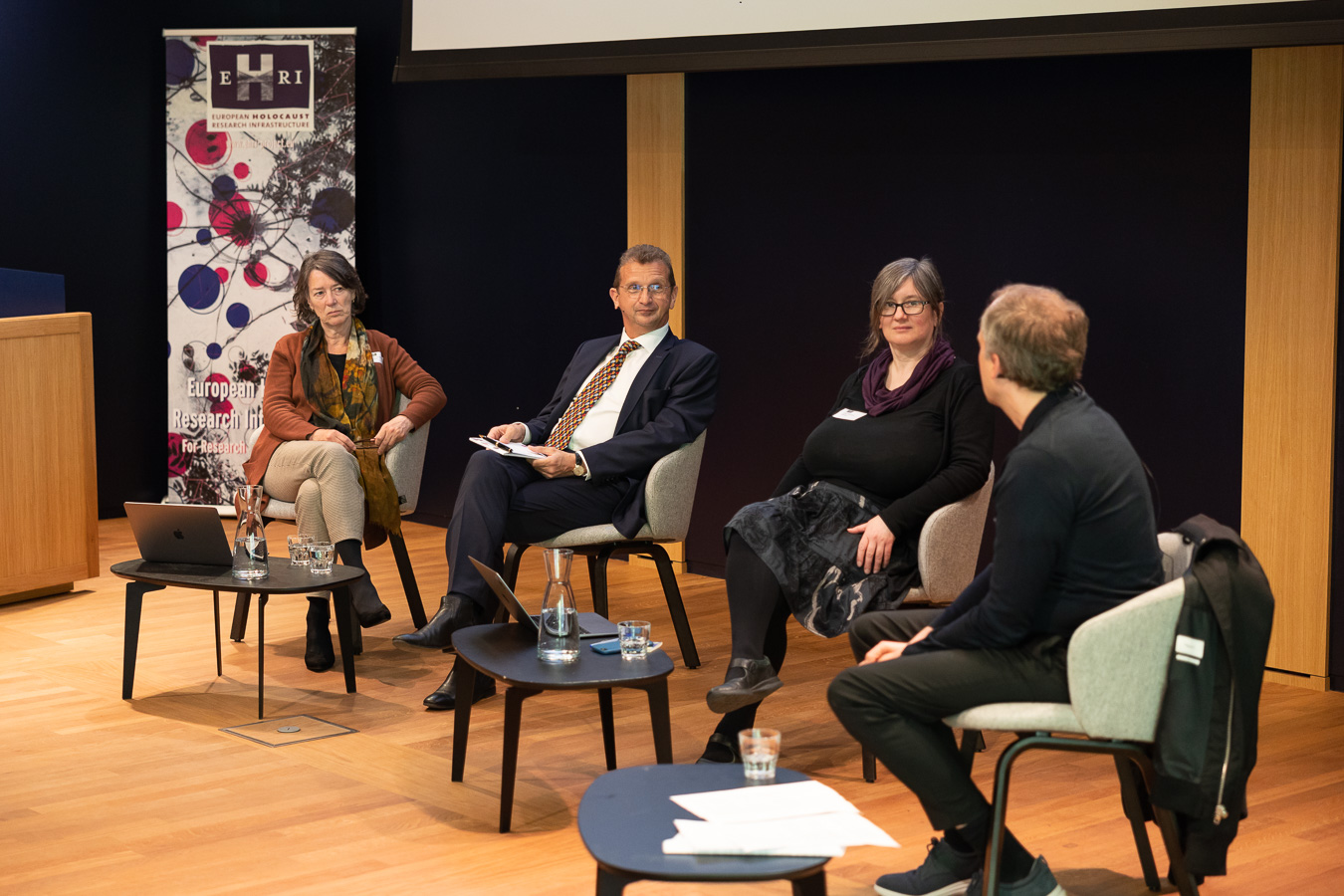
Sally Chambers and Tobias Blanke
The future
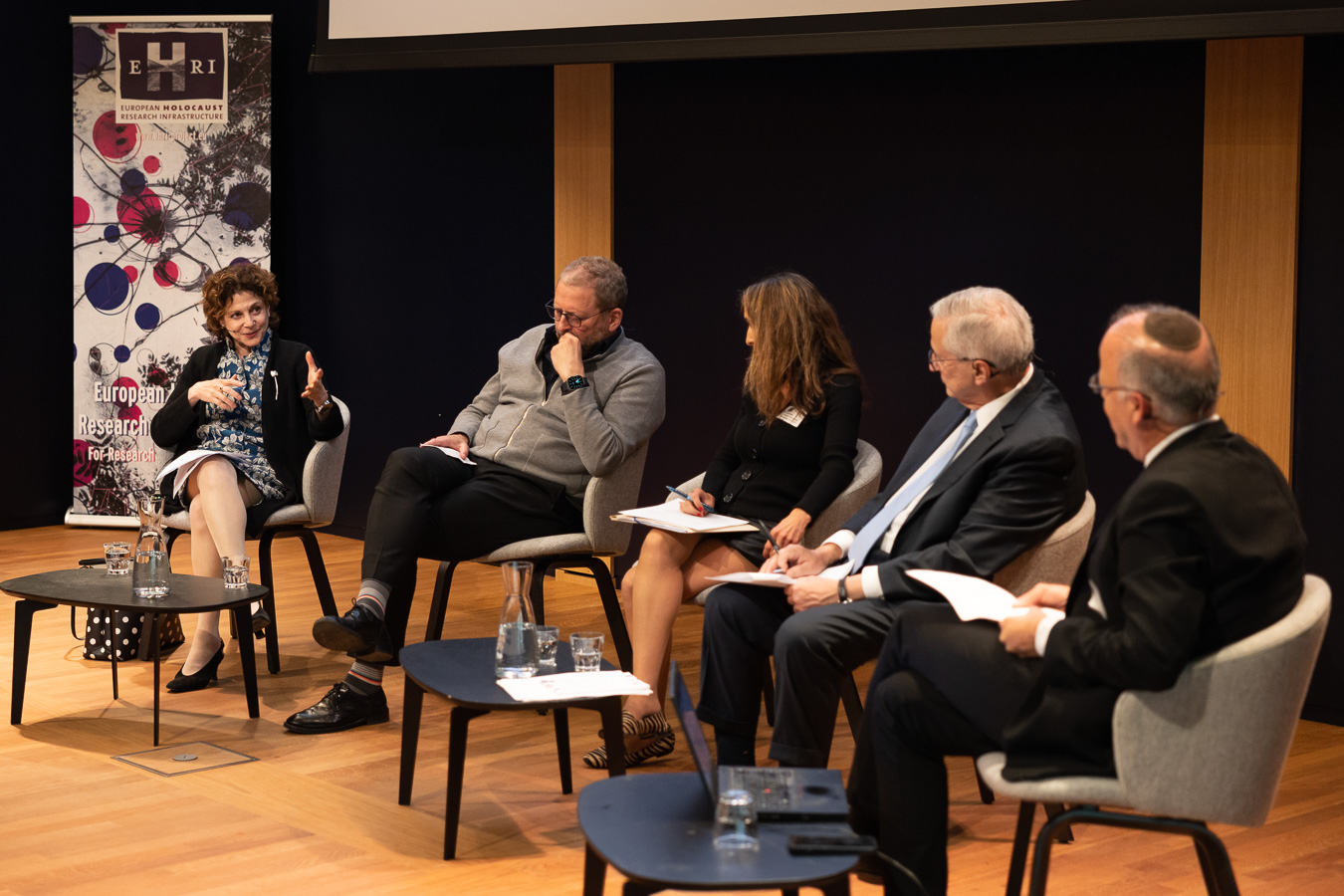
Emile Schrijver, Pascale Falek, Wesley Fisher and Haim Gertner
The last panel of the day was dedicated to the future: What does it mean to have a permanent Holocaust research infrastructure and how can it add value to related initiatives in the field of Holocaust commemoration, education and the fight against antisemitism? Four representatives of such related organisations, Wesley Fisher (Director Research, Claims Conference), Pascale Falek (Policy Officer, Office EC Coordinator on combating antisemitism and fostering Jewish life), Emile Schrijver (General Director Jewish Cultural Quarter Amsterdam, Chair of the Board of the Association of European Jewish Museums) and Nanci Adler (Professor of Memory, History and Transitional Justice, NIOD and University of Amsterdam, IHRA delegate) answered to questions from moderator Haim Gertner, Director International Relations at Yad Vashem.
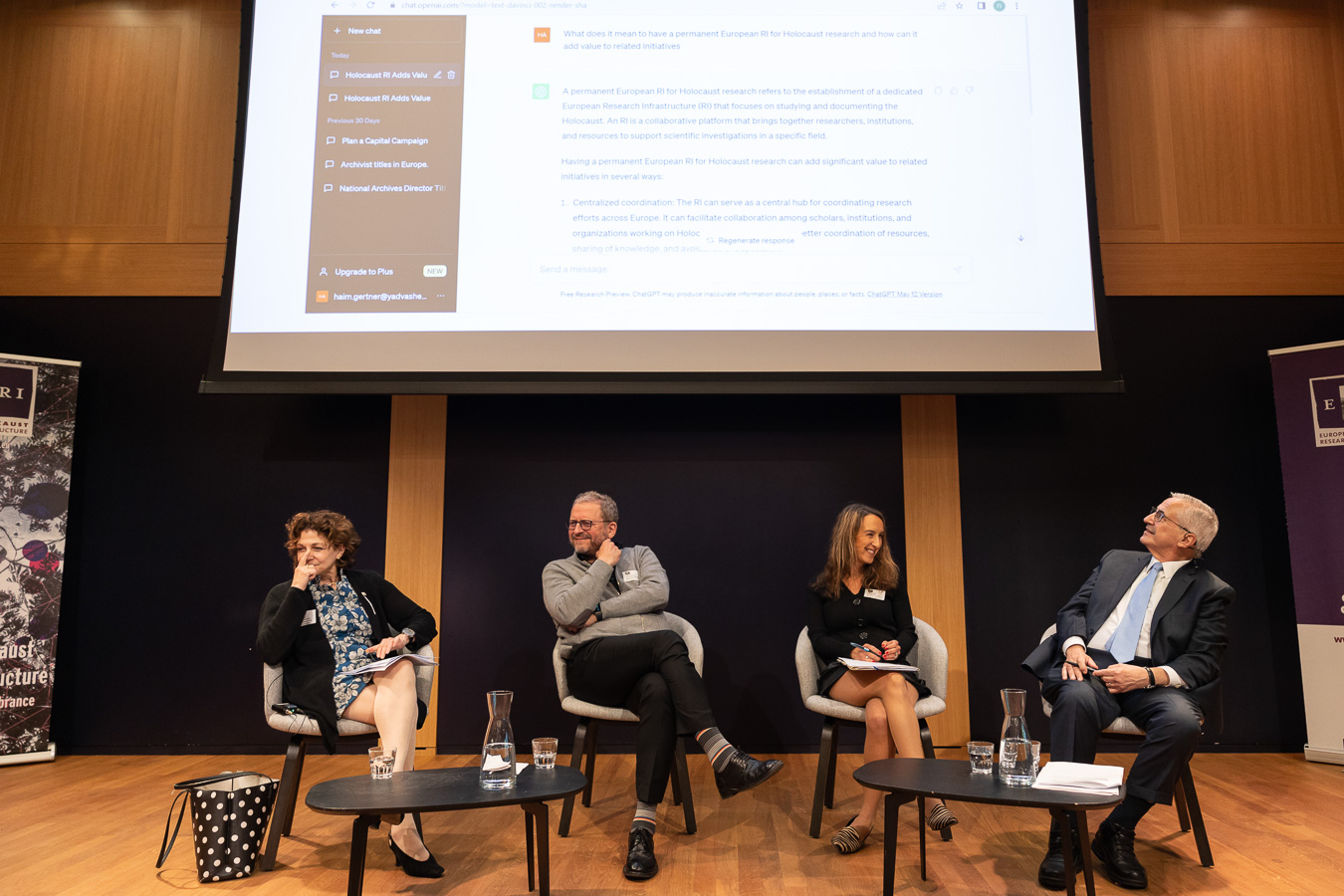
Emile Schrijvers, Pascale Falek and Wesley Fisher; On the screen: EHRI on ChatGPT
Dwindling number of Holocaust survivors
Something that worries everyone involved in Holocaust research, education or commemoration, is the dwindling number of Holocaust survivors. These people, who are direct witnesses, are passing away. Wesley Fisher of the Claims Conference stressed that therefore it becomes more important than ever to safeguard testimonies and Holocaust-related objects or artefacts that can tell a story as well. This is partly what Holocaust or Jewish museums are now focusing on. Emile Schrijver, Director of the Jewish Museum Amsterdam, who was a scholar before he became museum director, saw opportunities for museums to bridge the gap between academic research and a more general audience. If often takes time for new research insights to trickle down into education or commemoration. Safeguarding and new insights, education and commemoration stay vital. Nanci Adler pointed to the Russian war against Ukraine which can only be understood with knowledge of the history and is a warning that “Never Again” is not a given, but should be repeated with every new generation. Pascale Falek, who is working on a setting up an infrastructure for research into antisemitism, also stressed the relevance of Holocaust research for today’s developments that see a rise of nationalism and antisemitism.
A teenager
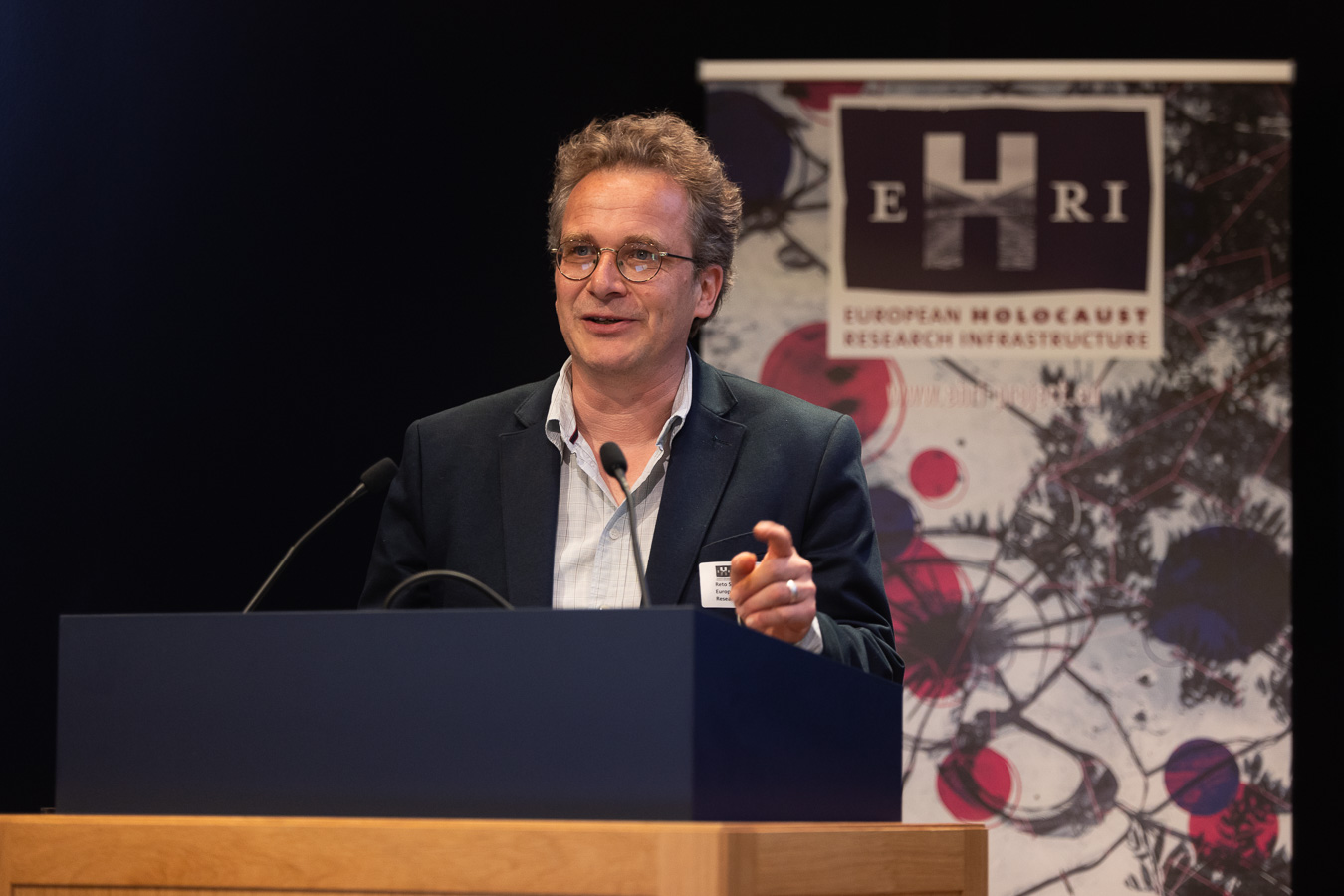
The last word of the day was for co-Director Reto Speck, who concluded that the conference had not only shown that EHRI was well on its way to becoming an ERIC, but that there also is a definite need for a permanent European Holocaust Research Infrastructure. EHRI has been active for thirteen years now, and is well on its way to reach maturity by becoming a permanent European organisation in January 2025. Reto therefore compared EHRI’s current status to that of a teenager: in between, sometimes difficult, but also increasingly independent and self-assured and with ambitious plans for the future.




All images: Maarten Nauw for EHRI
